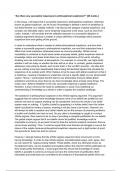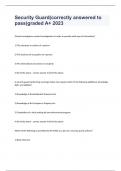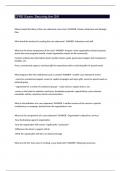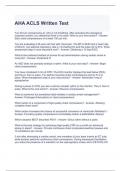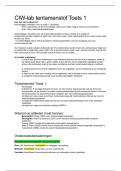“Are there any successful responses to philosophical scepticism?” [25 marks.]
In this essay, I will argue that a successful response to philosophical scepticism, otherwise
known as global scepticism, can be found if knowledge is defined in terms of reliabilism (a
true belief formed via a reliable method). I will discuss the dangers of global scepticism, and
consider, but ultimately reject, some empiricist responses to the issue, such as ones from
Locke. Instead, I will conclude that the reliabilist response is a successful objection to
sceptical arguments because it creates a unique definition of knowledge which prevents
scepticism from ever getting off the ground.
In order to understand what is needed to defeat philosophical scepticism, and thus what
makes a successful response to philosophical scepticism, we must first understand how it
differs from local scepticism (otherwise known as normal incredulity). Whilst normal
incredibility is contained to doubt about certain everyday beliefs, global scepticism tests all
knowledge claims and raises doubt about our whole experience of the world, including
doubting even the most basic of assumptions. For example, in normal life, we might doubt
whether it will rain today or whether the train will be on time. In contrast, global scepticism
addresses more extreme doubts, such as the brain in the vat (BIV) scenario - the idea that
we are nothing more than disembodied brains being fed electrical signals that simulate the
experience of an outside world. What I believe to be the issue with global scepticism is that it
is infectious, meaning it threatens to undermine not just a specific belief, but our whole belief
system. Hence, I would argue that the task for any philosopher trying to defeat global
scepticism would be to prove that we can have knowledge about at least some things. The
reason why I believe reliabilism is the only successful response to global scepticism,
therefore, is that it removes the need for justification or proof, thus redefining our
understanding of knowledge as a whole in order to bypass the sceptical challenge.
The backbone of philosophical scepticism is the infinite regress argument. This argument
suggests that we cannot have knowledge because none of our beliefs are justified as any
premise we have to support anything can be questioned, and thus the whole of our belief
system rests on nothing. If I justify a belief by appealing to a further belief, then this further
belief must itself be worthy of assent, meaning it will also have to be known. However, we
will always be able to question any further beliefs and so the process of producing evidence
to justify one's beliefs can have no end. So any claim to knowledge is caught in a vicious
infinite regress: there seems to be no way of providing a complete justification for our beliefs.
The global sceptic argues that if our beliefs cannot be justified, knowledge must be
impossible to come by, so we seem forced to draw the extreme sceptical conclusion that we
cannot know anything. Thus, it could be argued that most theories will struggle to survive the
claims of the sceptic because philosophical scepticism requires such a high burden of proof
that grounds for doubt are hard to remove.
However, I strongly believe that the infinite regress argument does not prevent us from
having knowledge. In order to stop infinite regress, foundationalists argue, and I agree, that
we can search for 'regress-ending' beliefs. These beliefs, which are otherwise known as
foundational truths, can be accepted as knowable without the need for further justification as
they simply justify themselves. I would argue that this shows that knowledge of certain
beliefs is possible to come by as long as we have the correct kind of justification. Both
rationalists and empiricists are committed to the existence of foundational beliefs which are

